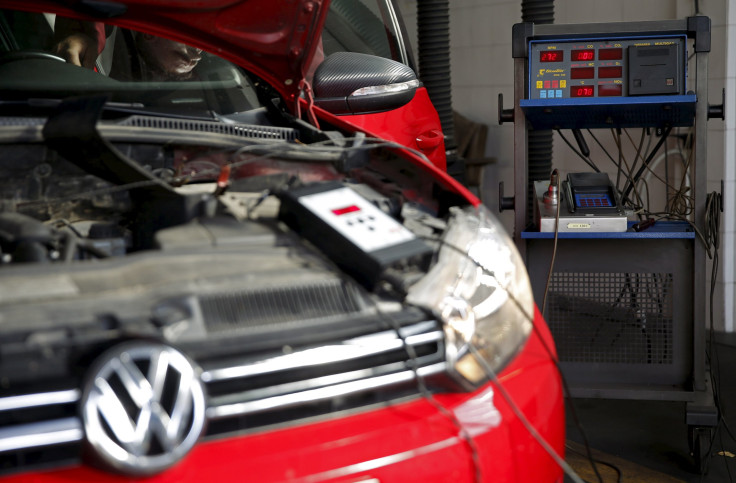Volkswagen Diesel Scandal: Is The EPA Partly To Blame?

Since Volkswagen admitted this week to cheating on pollution tests for years, there has been a flood of outrage. Overwhelmingly, it is directed at the most obvious culprit: the German automaker, which admitted to equipping 11 million of its diesel cars worldwide with software specifically designed to reduce emissions during tests. But some critics argue Volkswagen is not the only one to blame. Are the regulators at fault, too?
“Automakers have been able to exploit lax testing systems in the U.S. and Europe,” declared a Bloomberg editorial this week. “Regulators owe it to both car buyers and the environment to make these systems more rigorous.”
In the United States, critics say, the Environmental Protection Agency isn’t as strong a watchdog as it should be. The editorial board at Bloomberg says the EPA gives automakers like Volkswagen too much latitude in determining testing conditions. The agency doesn’t have engineers on hand at the labs that actually conduct the exams, doesn’t vary its testing routines enough and should have done more to detect the sneaky software gambit that will likely lead to the recall of some 500,000 cars in the U.S.
The EPA did not respond to requests for comment.
Volkswagen’s deception may be particularly widespread and therefore more egregious. But it’s not the first company to cheat American emissions standards. Hyundai and Kia acknowledged they overstated fuel economy standards on 1.2 million cars from 2010 to 2012. Last November, the companies agreed to a combined $300 million settlement with the Justice Department and the EPA for doing so.
Still, Tyson Slocum, director of the energy program at consumer advocacy group Public Citizen, said it’s unfair “to claim the EPA is responsible for a very sophisticated deception.”
Emissions tests in the United States consist of the following: Automakers put their cars on rollers at various testing sites and run them through a set of federally approved maneuvers. Volkswagen duped the system by writing code into its diesel cars' software that automatically switched them into a sort of “low-emissions mode” during these moves.
Even with a beefed-up team of monitors on hand at testing sites, Slocum said, Volkswagen’s trick “would have been very hard to catch." "Stopping a determined criminal is tough," he said, and “at the end of the day, you’ve got to hold the primary entity accountable.”
At the same time, Slocum said, those complaining about the agency’s oversight methods or regulatory capabilities should turn to federal legislators.
“Congress is to blame for the EPA’s light touch,” he said. He scoffed at the “Chicken Little” attacks from federal lawmakers and industry alike that frequently deride the agency as a jobs killer. Since 2010, the agency has seen its budget decline by 20 percent, or about $2 billion. (Earlier this month, before the emissions scandal broke, 20 members of Congress filed articles of impeachment against Gina McCarthy, head of the EPA.)
Europe’s testing system, on the other hand, is widely seen as more hands-off than the United States'. Automakers there comply with the New European Driving Cycle, a test that got its last major revision in the 1990s. It takes less time to complete than its American counterpart and doesn’t properly simulate real-world conditions, critics contend, and therefore is easier to game. A recent report from the U.K. Committee on Climate Change found the gap between official and real-world emissions of new passenger cars rose from 10 to 35 percent between 2002 and 2014.
The European Environment Agency is an agency of the European Union that provides information to policymakers, but does not implement policy itself. That responsibility lies with the European Commission.
Bill Becker is the executive director of the National Association of Clean Air Agencies, a group that represents state and local pollution control agencies. He said “the EPA certainly has a role but they don’t deserve a severe whipping about what happened.”
Those concerned with preventing similar conspiracies in the future should look toward the judicial system, which has the ability to set a strong deterrent effect, he said. Penalties wield far more influence over automaker behavior than any changes to emissions testing procedures.
“The solution here is for the courts and the Justice Department to impose as severe a penalty as possible,” he said, “to penalize so harshly that no other employer would ever consider this again."
Correction, September 28, 2015, 9:15 a.m. EDT: An earlier version of this story implied that the European Environment Agency is responsible for auto emissions standards. Unlike its U.S. equivalent, however, the European agency does not implement policy. The story has been updated to reflect this fact.
© Copyright IBTimes 2024. All rights reserved.





















